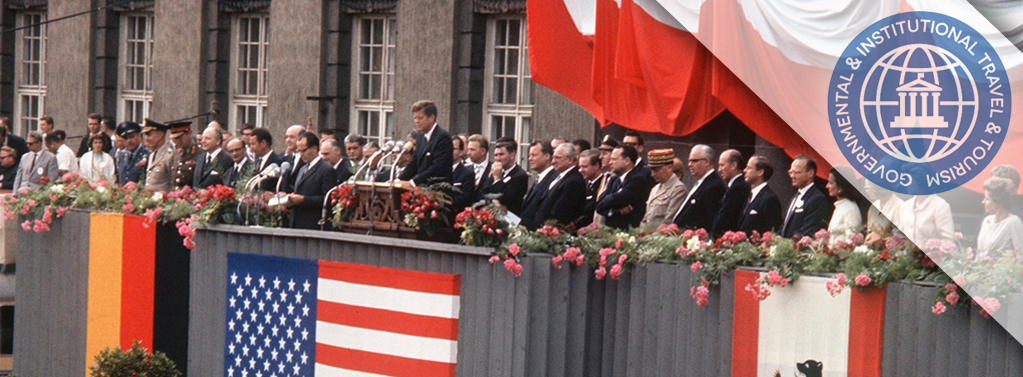 Although the travel of governments and institutions has evolved significantly in recent decades, it is true that they experienced a major boom during the so-called Cold War, which maintained a constant tension between the Western bloc, led by the United States, and the Eastern bloc, with the Soviet Union (USSR) as a reference.
Although the travel of governments and institutions has evolved significantly in recent decades, it is true that they experienced a major boom during the so-called Cold War, which maintained a constant tension between the Western bloc, led by the United States, and the Eastern bloc, with the Soviet Union (USSR) as a reference.
This period of tension, which lasted almost fifty years, was characterized not only by military and nuclear escalation and the space race, but also by a multitude of diplomatic moves, staged through the movement of leaders and high-level representatives, who sought, in one way or another, to bring the two powers closer together, as well as to gain confidence and influence in certain countries and territories.
One of the protagonist regions during the Cold War was precisely Germany, which was divided into two parts: the Federal Republic of Germany (FRG), with its capital in Bonn and positioned in the Western bloc; and the German Democratic Republic (GDR), aligned with the USSR, and whose capital was a Berlin divided into two parts, first by a barbed wire fence and later by a wall.
Both the division of Germany and the division of its historic capital, Berlin, caused moments of great tension between the two blocs. For this reason, and in view of a possible escalation of the conflict, the then President of the United States, John F. Kennedy (JFK), made a trip to West Berlin, that is, the part of the city that was under the control of the FRG.
This trip, which has gone down in the annals of history for a multitude of reasons, finds its starting point precisely in other trips and governmental summits. The previous summits in Geneva (Switzerland), Camp David (USA) and Paris (France) ended without agreements or rapprochement between the two blocs. In addition, the Cuban Missile Crisis a year earlier, as well as the delicate situation in Laos and Vietnam, seriously threatened Kennedy's interests, whose foreign policy was beginning to deteriorate.
President Kennedy, his Cabinet and the Travel Unit envisaged all this as a multi-destination trip that would have as its fundamental objective a visit to West Berlin, vindicating both the role of the US in Cold War Europe, as well as support for the citizens of the FRG, in the face of the blockade that existed against the GDR and the USSR.
All this began with a visit to Paris, in which Kennedy met with his French counterpart, Charles De Gaulle, in which they analyzed the geopolitical situation in Western and Eastern Europe. It was a bilateral summit, with an important deployment of security, media coverage and protocol, which ended with a joint declaration by Kennedy and De Gaulle regarding the "German problem".
After the summit, Kennedy made a stopover in Vienna, where he had met years earlier with Soviet leader Nikita Khrushchev, without reaching any common ground on the situation in Germany or nuclear disarmament. After this stopover, the American delegation traveled to West Berlin on June 23, 1963, coinciding with the 15th Anniversary of the American Airlift to Berlin, and being the first visit of a US President to Germany after World War II.
The expectation was total, and in Berlin, both on the part of the Delegation's security team, the US troops stationed in Germany, and the Armed Forces and Police of the FRG, a large deployment was made, whose objective was not only to safeguard the security of the Delegation, but also of the Berliners themselves, who flocked to the Schöneberg Town Hall to receive Kennedy and his Delegation. A large and complex motorcade transported President Kennedy to the City Hall, who arrived accompanied by his German counterpart, as well as other high authorities of the FRG.
Both the trip and the media coverage were a great success for the Kennedy Administration, since the President gained the confidence of Chancellor Konrad Adenauer, commemorated the 15th Anniversary of the Airlift and, in addition, went down in history thanks to his famous speech that began proclaiming in German 'Ich bin ein Berliner', that is to say, "I am a Berliner", with which he also gained the confidence of the citizens of the FRG, strengthening even more the ties between Washington and Bonn.
Such was the impact of Kennedy's visit to West Berlin that the tension between the two blocs diminished notably, initiating an important period of détente between the US and the USSR, which would continue later with Johnson, Ford and Brezhnev. In perspective, in addition to his famous speech, JFK's visit to Berlin is a perfect example of how governmental and institutional trips also function as important diplomatic tools, reducing tension between countries and territories, as well as strengthening ties between them.





